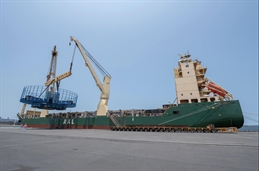
Project cargo, like the rest of the industry, has been dragged by the coronavirus pandemic which has impacted manufacturing and put on hold existing projects worldwide, causing a slowdown in demand for moving breakbulk.
Christophe Grammare, the Singapore-based commercial director of AAL Shipping, said aside from the challenges brought by Covid-19, there’s also the impact of the ongoing trade rift between some of the world’s largest economies, adding more pressure to the industry.
“The Covid impact on the breakbulk, heavy lift and project cargo is slowing down fabrication and therefore reducing volumes overall,” Grammare told Asia Cargo News, noting that 2020 also saw added pressure from trade wars and “commodity price insecurity – especially in oil prices.”
“As forecasted, production and international cargo movements have declined rapidly since the start of the outbreak. Initially, the slowdown of imports and exports took hold in China, then Korea and Japan – in all cases resulting in the forced reduction of shipments, delayed project cargo readiness and in many cases cargo bookings cancellations,” he added.
Boost from China’s Belt and Road initiative
The AAL Shipping executive noted, however, that the main change seen in Intra-Asia shipping over the past few years is the infrastructure investment and development in China’s Belt and Road initiative which has been sustained – albeit at reduced levels.
“Now that contagion is spread across the world and the lockdown of many markets has caused business and public upheaval and there is very little appetite for investment and project greenlighting in the private sector nevertheless as countries initiate stimulus packages we are starting to see infrastructure projects emerging,” Grammare said.
While China is slowly recovering, however, he noted that AAL has been experiencing low cargo demand from its trading partners in Oceania, the Middle East, Europe, the U.S. and the rest of Asia.
Nonetheless, the shipping executive said compared to the rest of the freight shipping industry, the multipurpose project heavy-lift sector is less impacted by the sudden shift in demand and capacity.
“Cargo demand for consumer/FMCG (fast-moving consumer goods) products, i.e., containerized cargo, is much more sensitive and [more quickly] impacted due to these changes than the project cargo sector, where we see breakbulk and project cargo volumes steady with no increase in capacity required,” Grammare told Asia Cargo News.
“Most of the intra-Asia project cargo movement is satisfied by a multitude of tramp sailings, with still no need for fixed scheduled liner services. There is enough MPP tonnage moving within or passing the intra-Asia zone to cater for current cargo demand,” he added.
More stability for heavy lift in Q4
Grammare said for AAL Shipping, the focus in the region is mainly for transporting complex and/or heavy cargoes – with pricing in other segments “highly competitive.”
“Our sailing frequency between Europe-Asia, Middle East-Asia and Asia-Australia offer a ready solution and economies of scale for the carriage of intra-Asia cargo. Nevertheless. rates intra-Asia are highly competitive in view of the access of tonnage available, therefore AAL usually focuses on complex and heavy cargoes,” he said.
For AAL, the region accounts for “probably between 10% and 20%” of its volume, according to Grammare.
“Considering the current challenges facing the region we do not expect any huge movement in the intra-Asia breakbulk, heavy lift and project cargo market,” he added.
Meanwhile, the global multipurpose shipping operator noted that the pressure in the industry would remain in the short term and the recovery would depend on various factors including government support for the industry which he described as “most important” to prevent the collapse of some players.
“The short-term will remain pressured and recovery time depends upon the ability of markets to contain the virus spread and also the appetite of governments and financial institutions to support their businesses with desperately needed fiscal support policies,” Grammare said.
“The most important measure that can be implemented at this time within any market is fiscal government support for corporate business and capital injection into Asian economies. This is necessary to stimulate trade and cargo movement.”
He noted that maritime transport is essential to the world’s economy with over 90% of the world’s trade carried on ships – and thus, such policies are “needed more than ever” to “get the industry and the wider global economy back on track.”
“By Q4 2020 we had hoped to see more stability in global markets and trade emergence. We even predicted growth, as markets recover and start to refill their depleted stocks of goods, resources and commodities,” the AAL executive said.
“Unfortunately, no one knows the exact timeline of recovery and, in this sense, unsupported companies within our sector across the board are in danger of serious repercussions and possible collapse as we witnessed even before this crisis,” he added.
By Charlee C. Delavin
Asia Cargo News | Hong Kong



